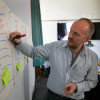
Ronald Macintyre of Opening Educational Practices in Scotland (OEPS) gives an introduction to their open learning project and explains why our teams are working together to develop learning resources for people interested in end of life issues.
Who are OEPS?
The easiest way to talk about who we are and what we do is to start by defining some of the buzzwords, OER, well it stands for Open Educational Resource, the key bit is the Open, here we are talking about openly licensed materials (mostly Creative Commons), often shared online, designed in ways that allow the 5Rs of OER: Reuse, Revise, Remix, Revise Redistribute, and Retain.
You have probably encountered the CC licence on YouTube and educators will certainly encounter content from openly licensed sites like Wikipedia, for good or ill. Most people have heard of MOOCs, or at least this is what enthusiasts who talk about MOOCs think, since they see Massive Open Online Courses as a disruptive innovation that is going to fundamentally alter education.
While MOOCs are the talk of the University corridors and have high uptake amongst those who have been to University, it is not clear whether we are in a Schumpeterian moment of creative destruction, but it does seem clear that mostly this is an internal HE conversation.
The narrative has tended to focus on the M Massive; the large numbers are beguiling, and coupled with the open it seems to offer more egalitarian access to education. However, to date the data suggest otherwise, while the promise is access, those that are accessing these free open resources tend to be the educational ‘haves’.
At Opening Educational Practices in Scotland (OEPS) it is our sense that if the Openness is to lead to a more egalitarian approach to education then we need to look to participation, we need to look at what enables participation, and how to broaden the socio-economic base of those who access these open and free resources. We need to look at educational practice.
Hence the title of our project, which signals a shift within the Open Education movement, where it tended to focus on the R for resources, whereas we are interested in the P for Practice, we are interested in what openness enables.
How do we go about our work?
So far I have mentioned 2 P’s: Participation and Practice, and I have another one, Partnership. Our project is about educational practices that support the development and use of open and free educational materials, educational practice concern questions of what to do and are best served by doing something, what we have found is the most effective way to ensure participation is to work in partnership, embedding educational practices in partners’ networks.
I forgot one more P, Public Good. Here we have questions, around what it means for education providers, but specifically how those meaning are reconfigured and/or enabled by the internet and by openness. I suppose the sense of public good underpins the OER/OEP movement, a sense that publically-funded knowledge and/or organisations ought to ensure that knowledge is available to the public.
Of course the other side of being public, as many commentators have noted, is the ability to enhance reputation through using public engagement to colonise a discourse. To achieve this you need to have the capacity to create high quality engaging materials.
When we sit down with potential partners and consider things like End of Life these are the kinds of areas we explore: questions of public good, and strings of related questions like who are the public, for what reason, what does it enable for them.
It comes back to educational practice and what openness enables underpinned with a focus on partnership and participation.
What is so interesting about the End of Life Studies project approach?
Partners have the content/subject knowledge, but crucial is the need to have a sound knowledge of their users. Often this developed “in the old fashioned way,” on the ground, but with a sense they need to shift with their users and questions about what being open and online might enable them to do differently.
What was interesting about the Glasgow End of Life Studies Group was that, rather than wanting to extend their community through being open and online, they already had an established open online community.
Their blog, this blog, is visited by a range of users from all over the world. It is an established community of people who are seeking to know more.
This is about extending within the online space rather than onto it, but of course End of Life is about very practical concerns, ones that are embedded in particular contexts, in places and in very corporeal concerns.
So for us, as well as ticking a lot of the boxes in relation to our P’s, it was also a very novel approach, to developing structures and content to satisfy a growing and existing online community whose concerns were very embodied about practical things in the world.
Ronald Macintyre
@roughbounds
@OEPScotland

